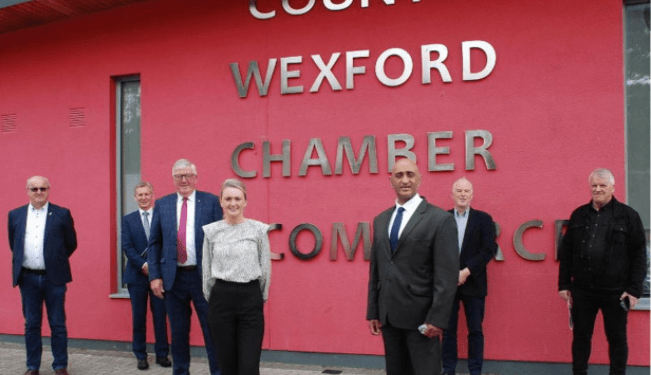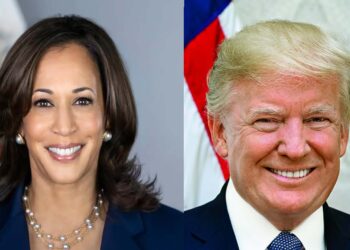by Miceál O’Hurley
DUBLIN – In December, 2019 news emerged of a novel strain of a coronavirus with an alarming infection rate. To date, some 533,773 people worldwide have been reported to have died because of the Covid-19 pandemic. In countries like the United States the infection rate is again on the rise after they have lifted travel and business restrictions. The pandemic’s toll throughout the world has been devastating, wrecking economies, stressing health care systems and causing countries to impose travel bans and restrictions to thwart the spread of the virus. As Ireland and the EU continue to lift many of the restrictions previously imposed to help contain the Covid-19 pandemic it gives us time to reflect upon the work of diplomacy in action and the critical role played by the Diplomatic Corps in continuing to serve people during the crisis.

We are continuing its profile of diplomatic missions in Ireland to provide an insight into how diplomacy has been conducted during these trying circumstances and provide some insight into the challenges that may lie ahead. In this interview, His Excellency Mr. Sandeep Kumar of the Embassy of India to Ireland was gracious enough to share some of his thoughts with me..
Having joined the Indian Foreign Service in 1985, His Excellency Mr. Kumar has served in diverse postings including Croatia, Hong Kong, Hanoi, Paris, Cape Town and Kabul during his almost 35 years of diplomatic service. From September 2008 to January 2013, His Excellency was on deputation to UNDP in Kabul (Afghanistan) where he worked on police reforms. Following this posting, from February 2013 to August 2015, he served as Joint Secretary in the West Asia and North Africa (WANA) Division of the Indian Ministry of External Affairs. His Excellency Mr. Sandeep Kumar presented his letters of credence extraordinary and plenipotentiary to President Michael D. Higgins as the Ambassador of the Republic of India to Ireland on 6 December 2018.
Your Excellency, thank you for taking time out of your busy schedule to speak with me about your work during the Covid-19 pandemic. If you would, please tell me, what did you find to be the greatest challenge that emerged for your Mission during the Covid-19 pandemic?
This was to instill faith and confidence in Indian citizens, particularly students, who found themselves stranded in Ireland on account of the international travel ban, and went through phases of depression and anxiety. As per registration data with the Embassy, there were around 1,500 such people throughout the country at the commencement of the lockdown period (out of total of around 45,000 Indian community members). The Embassy set up institutional mechanisms, at central and county level to reach out to these citizens and offer full assistance. Our main message was that history would judge us on what kind of contribution each one of us made to tackle the crisis – whether we buckled under pressure or demonstrated resilience, fortitude, community solidarity and civic responsibility to battle the virus.

One of the significant challenges for Missions throughout the world was helping to repatriate nationals who were abroad once borders began to close. What was your experience in this regard?
The Embassy has so far assisted around 600 people to be transported through direct special repatriation flights from Dublin to various destinations in India, organised by the Government of India. These included people having medical emergencies, deaths in immediate families, pregnant women, tourists with expired visas, professionals who lost jobs, and students. Globally, 0.38 million stranded Indians have been assisted to return safely to their homes.
That is astounding. Mr. Ambassador, it became common knowledge that the Indian community was exceptionally well organized and comprehensive with its outreach in Ireland during the ‘lockdown’. Given the general prohibition on travel and restricted visits to Embassies during the early months of the pandemic, what are some of the ways your Mission adapted to meet the needs of people asking for services?
The Embassy set up various institutional mechanisms for providing assistance to Indian nationals. One that worked very well was the mechanism of the Community Support Groups (CSGs), set up in all major cities such as Dublin, Cork, Galway, Wexford, Athlone, Sligo and Limerick representation of community members from diverse professions like doctors, academics, clinical psychologists, business people and community workers. They provided round-the-clock support and counseling on matters of accommodation, finances, health and depression as well as student visas. We were given to understand that several Covid positive cases recovered fully, based on timely medical advice and prescriptions by doctors in the CSGs.
Effective partnerships were also set up with regional Indian Associations representing different provinces of India, religious bodies and voluntary groups for free delivery of food and medicines to the needy. The local Gurudwara (Sikh temple) distributed around 700 food packets everyday to front-line workers. For the welfare of Indian students (there are around 5,000 throughout Ireland) liaison was maintained with the Heads of major Universities like TCD, UCD, DCU, DBS, NCI, NUIG, UCC, AIT and the University of Limerick for establishments of special support structures to deal with the pandemic.
Regular webinar interactions were held with Indian community members and students. Additionally, as part of programme to lift spirits, virtual Yoga, dance and meditation classes, virtual screening of films, as well as cookery sessions were organised.
Sourcing Personal Protective Equipment (PPE) has been problematic and continues to be a challenge for many countries still. What has been your Mission’s and India’s experience with these issues to date?
We all understand that every country in the world experienced difficulties in procurement of PPEs, which were in short supply, given the magnitude of the pandemic. There were queries from India regarding procurement of high quality PPEs from Ireland, but these could not be sourced, given Ireland’s own demand and shortages. Similar was the experience regarding sourcing of rapid testing kits where Irish equipment did not match India’s required specifications. On the other hand, India lifted restrictions on sale of Paracetamol to Ireland, paving the way for supply of 1,500 MTs of doses.
There are accounts of diplomats, their spouses or staff serving around the world who fell victim to Covid-19 in the service of their countries. Did your Mission or country experience any losses or illnesses in your diplomatic community during the Covid-19 pandemic to date? What steps are your diplomats taking to keep safe?
Fortunately, there were no Covid-related losses amongst the Indian diplomatic staff in Ireland. Some isolated cases of illness were reported from other Embassies globally, but they recovered fully.
As we move in the next phase towards lifting of restrictions, it will be extremely important for everyone, including diplomatic staff, to maintain adherence to the health protocols of social distancing, wearing of face coverings in crowded public places, and washing of hands. This will be the ‘new normal’ for the coming future.
What are some lessons learned during the Covid-19 pandemic that you think will have an impact on how diplomacy is conducted in the future?
There will be a tendency to avoid large gatherings. Office timings will become staggered. More extensive use of technology in our everyday functioning will be the new norm. Interactions will increasingly shift to virtual platforms such as virtual summits between Heads of Government, Ministers and other officials; online academic and cultural programmes; web-based business exhibitions and conferences; as well as online procurements and evaluations.
Many events that the Embassy would usually host in-person will be adapted to be delivered online. Recently, the International Day of Yoga held with limited number of participants at the Dun Laoghaire Harbour Green was live-streamed to more than 10K people practising from home, and this will be the new format of diplomatic outreach. This will also require more secure network systems which cannot be easily hacked. In my view, the new norms of functioning, if applied creatively, can make diplomacy more effective.
Are there any changes in the way you will provide Consular services for the foreseeable future?
The Embassy has started providing Consular services using virtual means to the extent possible. Visitors are discouraged to visit the Embassy without prior appointment. The number of people being received at the Embassy is being kept to a minimum, with full social distancing being observed. The public is advised to submit all necessary documentation by post. It is important that an environment be created where both the Embassy staff and clients feel secure.
What are the plans for India to move towards a ‘normalisation’ of travel and tourism?
At the moment, Covid infections and deaths in India are rising at an alarming rate in some key metropolitan regions. In this context, the Government would have to be very cautious in opening of the country for travel and tourism. While domestic travel has been opened up for reasons of family reunions and business, international travel ban on commercial flights remains in place – except for special repatriation flights bringing stranded Indians home from overseas destinations. For the foreseeable future, focus is likely to remain on domestic tourism, as it is in the case of Ireland.
Any pandemic is a tragedy. But even in such situations there are always stories that inspire. In the final analysis, how do you think it may be remembered in human terms?
In this pandemic, we, normal people, have shown exceptional courage, determination and community spirit. This may be our biggest challenge yet but we have not stopped being normal people. Far from denting out normal-ness, the pandemic, rather, has enhanced it. When it is all over, it will be remembered that each one of us cared deeply every single day of the crisis.
Every single person who died was not a statistic, but lived a full life. For me, the story of every brave man and woman dealing with the pandemic in his or her own way, harbouring not just insecurities and confusion, but embodying resilience and determination, is an inspiration. This pandemic, above all, will be remembered as a collective triumph of hope and faith over despair and negativity.
Dealing with the Covid-19 pandemic has consumed a lot of energy for all Missions of late. Beyond that, do you see opportunities that emerge from ongoing challenges in terms of collaboration between India and Ireland?
Every challenge can be turned around into an opportunity, even the most potent one like Covid-19.
As regards post-Covid partnership between India and Ireland, there can be opportunities in medical research and IT solutions like security applications, data analytics, AI, i-cloud messaging, geo-tracing, advanced BPOs and fintech. An Indian scientist at NUIG has developed de-contaminant anti bio-agent wipe in collaboration with the Irish Defence Forces, which can be useful for India as well. In context of “work from home”, the globally-reputed Indian company Tata Consultancy Services has offered test-run of software providing solutions for Irish schools to carry out remote lectures and assessments.
Additionally, there are a good number of Indian health care professionals working in front-line positions in Irish institutions in these challenging times and there is scope for recruiting more such professionals in the future. Besides, the institution of Yoga/Ayurveda Chairs in major Universities in Ireland will be helpful. These were some of the issues discussed during the telecon between the Indian Prime Minister Narendra Modi and former Taoiseach Leo Varadkar in April. We shall be taking up these proposals appropriately.
Your Excellency, I appreciate you having taken the time to share your thoughts with me. On behalf of Diplomacy in Ireland – The European Diplomat, please let me wish you well, good health and continued success for your and your staff as well as the people of India. Thank you very much.
You are very welcome. Thank you, Miceál.














































